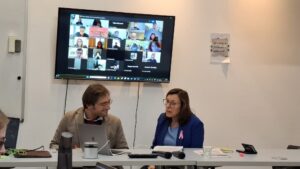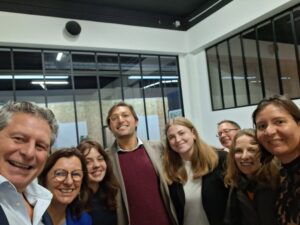On October 23, 2025, Eumans — together with Food For Profit, Greenpeace Luxembourg, Etika, CELL, and the Festival Alimenterre — hosted “Stop Intensive Farming! A People’s Assembly on the Common Agricultural Policy and Beyond”, a participatory event exploring how Europe can transition away from intensive and factory farming.

The Assembly brought together experts, activists, and citizens for an open dialogue with:
Giulia Innocenzi (Journalist, co-director of Food For Profit, an investigative documentary on intensive farming in Europe)
Tilly Metz (Member of the European Parliament, Greens/EFA, Agriculture Committee),
Xavier Turquin (Executive Director, Greenpeace Luxembourg),
Martina Pluda (Director, Humane Society International Italy),
Andrea Tesei (citizen activist who successfully stopped a factory farm in his region), and
Maartin Hietland (researcher at SOMO – Centre for Research on Multinational Corporations).
The discussions, followed by three thematic breakout sessions, produced a series of citizens’ proposals around three key areas:
1️⃣ Reforming the Common Agricultural Policy (CAP) 2027 and the European food supply chain
Led by reflections from Tilly Metz and Xavier Turquin, participants underlined that the next CAP reform must end subsidies for intensive and factory farming and redirect public funds toward small-scale, diversified, and organic farms.
Key proposals included:
- Defining and regulating “intensive farming” through measurable criteria such as livestock density and greenhouse gas emissions.
- Amending article 4 of the new CAP reform proposal. This article lists environmental priorities, including financial support for less intensive livestock methods, which are becoming mandatory. The exact budget allocation for these measures remains unclear.
- Setting clear emission-reduction targets for CO₂ and methane from agriculture.
- Discouraging trade agreements such as Mercosur that promote unsustainable imports.
- Establishing nature and food as common goods, ensuring everyone’s access to healthy, locally produced food.
- Redirecting CAP funds from monocultures and industrial meat producers toward sustainable, mixed farming systems that support community well-being.
- Introducing penalties for food waste and loss across the supply chain.
2️⃣ Legal Tools and Citizens’ Advocacy Against Intensive Farming
Led by reflections from Martina Plud and Andrea Tesei,, this session focused on strengthening legal accountability and citizen participation in challenging intensive farming practices.
Key points included:
- Implement legal actions to challenge the EU commission on topics such as the legitimacy of allocation of public funds to the meat industry considering the need for companies to comply with EU regulations on climate and environment.
- Creating transparent civic spaces — such as youth assemblies and citizens’ panels — to foster dialogue, accountability, and direct follow-up with EU institutions on the issue of intensive farming and CAP reform.
- Engaging communities through non-political, local events (e.g. food tastings, fairs) to raise awareness about the health and environmental impacts of industrial farming.
- Connecting people living far from farms through messages that link food choices, health, and climate.
3️⃣ The Financialization of Food and Global Tax Justice
Drawing on insights from Maartin Hietland (SOMO) and the ethical finance organization Etika, the final discussion examined the financial and fiscal structures sustaining intensive farming.
The debate highlighted that many large corporations — such as JBS, operating multiple holdings in Luxembourg — benefit from tax loopholes and public funding, perpetuating inequality and environmental harm.
Key proposals included:
- Introducing fiscal reform to make meat reflect its true social and environmental costs through progressive taxation, while reducing prices or applying subsidies to plant-based foods.
- Introduce incentives to make plant-based alternatives more affordable and accessible, and meat product more expensive
- Supporting global tax harmonization, as proposed by the OECD, to prevent corporations from exploiting fiscal loopholes.
- Recognizing nature, water, and food systems as common goods, following the ideas of Luigi Ferrajoli’s “For a Constitution of the Earth”.
- Enhancing transparency on food waste and incentivizing supermarkets to donate unsold food to social organizations or low-income people, as some are already doing

Participants agreed that financial justice is food justice: shifting public and private money away from harmful systems is key to creating fair and sustainable food economies.
Towards a Eumans agenda to stop intensive farming
The People’s Assembly showed up that the path beyond intensive farming is not only possible — it is already being designed by citizens, activists, and policymakers working together.
All three sessions pointed toward a shared vision: as Tilly Metz emphasized, reforming the CAP and fighting intensive farming means not just changing subsidies. It means changing our vision of society, and shift to one based on fairness, sustainability, and respect for all living beings.
For more information, please find:
- HERE the audio recording of the assembly;
- HERE the video recording of the Breakout Room 1 on CAP reform;
- HERE the video recording of the Breakout Room 2 on Legal and Civic Action Against Intensive Farming;
- HERE the video recording of the Breakout Room 3 on Financialization of Food;
- HERE the video recording of the final proposals summarised by note takers.
Building on all the ideas gathered during the People’s Assembly, Eumans will produce specific texts that will comprehensively reflect, as much as possible, the proposals that emerged. These drafts will soon be shared with activists and supporters of the campaign against intensive farming, before being submitted – in a later stage – to the European institutions.
The proposals in question will be discussed and analysed on a dedicated platform: Eumans has created a Discord channel to allow activists and interested individuals to engage in debate and contribute to shaping the movement’s political proposals.
You can create an account and join the Eumans Discord channel HERE — once inside, you’ll easily find a dedicated section on intensive animal farming, where you can access key information about the October 23rd Assembly and take part in the discussion leading to the development of new proposals.

